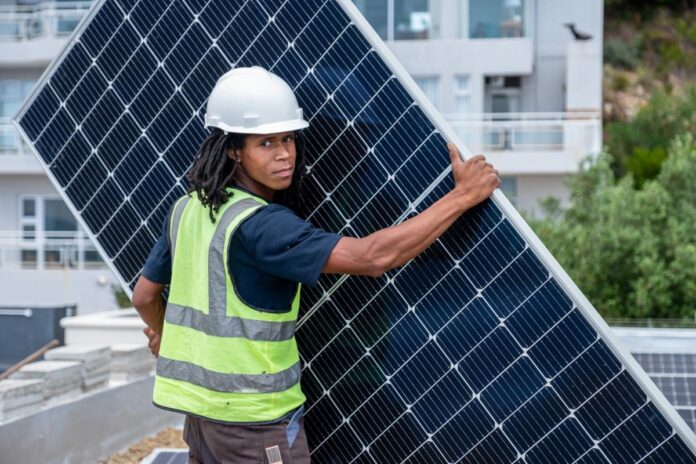A recent article by Elom et al., (2024) titled “Achieving carbon neutrality in Africa is possible: the impact of education, employment, and renewable energy consumption on carbon emissions” published in Carbon Research by Springer Nature shows that investment in renewable energy, education, and employment significantly reduces carbon emissions in Africa.
“
Investment in education, employment, and renewable energy significantly reduces carbon emissions, fostering a sustainable future for Africa and beyond.– Elom et al., (2024)
The study explores the relationship between education, employment, renewable energy consumption, and carbon emissions in Africa. The study analyzes the causal link between education, employment, renewable energy consumption, and carbon emissions in Africa, highlighting the potential for significant reduction in carbon emissions through these factors. Utilizing panel data from 32 African countries over 19 years, the study employs five rigorous regression models to demonstrate that investment in education, renewable energy, and employment are crucial in mitigating carbon emissions. The authors identify renewable energy, education investment, school enrolment, national income per capita, and employment as significant factors in mitigating carbon emissions. The study emphasizes the importance of achieving carbon neutrality in Africa and investigates the impact of education, employment, and renewable energy consumption on carbon emissions, utilizing a variety of panel regression models to analyze data from multiple African countries.
How the Study was Conducted
The authors employed panel data from World Development Indicators for 32 African countries over 19 years. The authors employed five different panel regression models to assess the effects of various predictors on carbon emissions. Focused on renewable energy consumption, carbon emissions, education expenditure, employment level, school enrolment, and net national income per capita the authors applied natural logarithmic values transformation, Granger causality test, and various unit root and cointegration tests using STATA 17 software.
What the Authors Found
The authors of the study found that Investment in renewable energy, education, and employment significantly reduces carbon emissions in Africa. In addition, the authors posit that there is a bidirectional causality between carbon emissions and factors like net national income per capita, education expenditure, and renewable energy consumption.
Why is this Important
Climate Change Mitigation: By identifying the significant role of education, employment, and renewable energy consumption, the study provides actionable insights for policymakers. Implementing the recommended strategies can contribute to reducing carbon emissions and combating climate change.
Policy Guidance: African governments can use the study’s findings to shape effective policies. Investing in education, promoting renewable energy adoption, and creating employment opportunities aligns with global efforts to achieve carbon neutrality.
Long-Term Benefits: The study emphasizes long-term benefits. If African nations prioritize education and sustainable energy sources, they can create a positive impact on the environment, public health, and economic stability.
Regional Context: Given Africa’s unique challenges and opportunities, understanding the interplay between education, employment, and carbon emissions is crucial. The study contextualizes these factors within the African context.
What the Authors Recommend
- African governments should prioritize education by increasing investment in schools, improving access, and enhancing the quality of education. Well-educated citizens are more likely to make informed decisions related to environmental conservation.
- Encouraging the adoption of renewable energy sources is crucial. Policymakers should create incentives for clean energy technologies, invest in infrastructure, and raise awareness about the benefits of renewable energy.
- Addressing unemployment is essential. By promoting job creation in sustainable sectors (such as renewable energy production and environmental management), governments can simultaneously reduce poverty and contribute to carbon emissions reduction.
- Policymakers should integrate environmental considerations into broader policies. For instance, education policies can incorporate environmental education, and employment policies can prioritize green jobs.
- Encourage collaboration between governments, NGOs, and research institutions. Continued research on the impact of education, employment, and renewable energy on carbon emissions is essential for evidence-based policymaking.
In conclusion, the study underscores the pivotal role of education, employment, and renewable energy in paving the way for a sustainable future in Africa. By embracing these pillars, African nations can not only significantly reduce carbon emissions but also foster economic prosperity, social equity, and environmental resilience. It is imperative for policymakers, stakeholders, and citizens alike to heed the findings and collaborate effectively towards a greener, more prosperous Africa and a healthier planet for generations to come.
















 The African Research (AR) Index is a comprehensive scholarly directory and database focused explicitly on journal publishers that publish and disseminate African research.
The African Research (AR) Index is a comprehensive scholarly directory and database focused explicitly on journal publishers that publish and disseminate African research.

